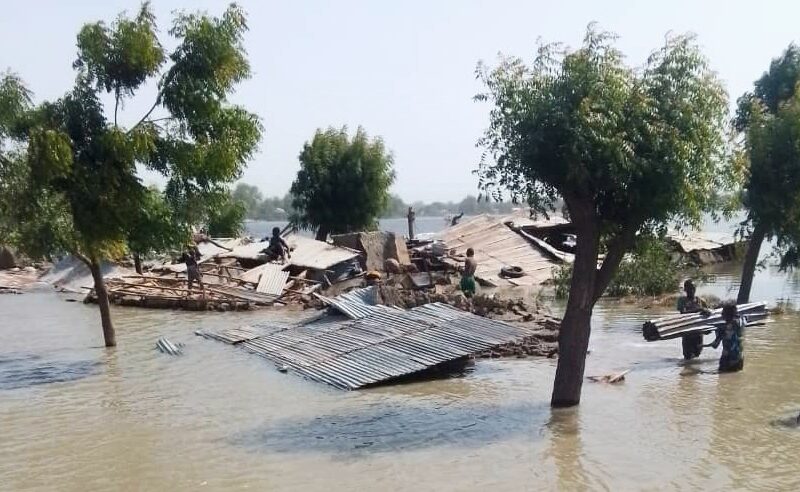No reported casualties or missing people, thanks to flood alert, but thousands of houses are submerged and destroyed – and some displaced people are living on the streets with nowhere else to go.
More than 10,000 houses in the Ngala district of Borno State have been submerged and destroyed in a devastating flood that has left thousands displaced.
Residents of Gamboru said the water began rising on Friday, December 6. By Monday, December 9, the rivers had overflowed their banks and the town was flooded.
Residents had been warned to expect flooding because the Lagdo Dam in neighbouring Cameroon was opened to release excess water.
Thousands of houses in the Ngala Local Government Area were submerged and destroyed. And thousands of residents were displaced.
Residents said they were grateful they received the warnings because many people were able to relocate to get out of harm’s way.
“For now, there have been no reported casualties or cases of missing people. The flood did not catch residents unawares as happened in Maiduguri in September when more than a million people were affected and at least 400,000 displaced,” said Malam Bulama, a resident of the Ngala district.
Alhaji Ibrahim Ibn Umar Ibrahim El-kanemi, the Shehu of the Dikwa Local Government Area, visited Gamboru town on Thursday, December 12, to commiserate with those affected by the flood.
He sympathised with residents and advised them to avoid building houses near waterways, on riverbanks or in any other areas prone to flooding to prevent a recurrence.
The Shehu toured the affected areas accompanied by the Umar Mohammed, the chairman of the Ngala Local Government Area.
He offered prayers for those who lost their properties in the flood.
Kaka Shehu Lawan, who represents the Borno Central senatorial district, sent his commiserations to flood victims on Wednesday, December 11.
His aide, Mohammed Mustapha, described the flood as unfortunate and sent the senator’s heartfelt sympathy, saying he would pray to Almighty Allah to grant solitude to those affected and to beseech God to prevent future occurrences.
To cushion the effect of the loss incurred by the flooding, Lawan ordered relief materials to be distributed in the affected communities of Badiaya, Bulabulin, Malumburi, Zawiya, Ghana, Kasuwan katako, Kasuwan shanu and Kalumburi.
Packages included blankets, wrappers and clothes, as well as food items such as rice, maize and macaroni.
The team returned to Maiduguri after the successful delivery and distribution of the relief packages.
Residents of Gamboru said this was the worst flood in the Ngala district since 1994.
“The floodwaters submerged and destroyed numerous houses and critical infrastructure. Thousands of people are homeless and are now displaced,” said Bulama.
“Many people are taking refuge in schools and government buildings. Some are stranded and are living on the streets.”
Bulama said it was mostly houses in riverine communities that were destroyed.
“The devastating flood occurred when the Lagdo Dam in neighbouring Cameroon was opened to release excess water. The flood has caused massive destruction of properties and houses, most of which were constructed from mud. They did not stand a chance; no mud houses could have withstood that amount of water. As a result, thousands of households are displaced and have been left stranded.
“We tried to stop the floodwater by using sandbags, but it was all in vain.
“We informed local authorities and non-governmental organisations [NGOs] but no one has responded or taken any measures to help us.
“We are pleading with the Borno State government and humanitarian agencies to respond. It is an emergency situation. The floodwater washed everything away.
“We desperately need food, shelters and medical supplies. Many of those affected are elderly people, women and children. They are truly suffering. May Allah see us through this.”
Goni Mohammed, a flood victim, told RNI that the devastating flood had displaced several communities, leaving thousands of households homeless and stranded.
“The massive flooding has destroyed many communities such as Zawiya, Badia, Bulabulin, Zero gate area, gate 1 area, gate 2, gate 3 and up to gate 7 area, Ghana area and Kasu-feye [the cattle market area]. Thousands of people are homeless and stranded. Many are taking refuge at school premises and other public buildings; others are squatting in their relatives’ homes. Some are living on the streets with nowhere else to go.
“We have not seen such flooding since in 1994. When the Lagdo Dam in Cameroon opened its sluice gates, water filled up rivers in the Ngala district, which overflowed and caused the flood.
“It has created a huge humanitarian crisis with women and children suffering because of a lack of basic amenities such as shelters, foods and medical supplies. We are pleading with the government and humanitarian agencies to come to our aid.”
SHETTIMA LAWAN MONGUNO









